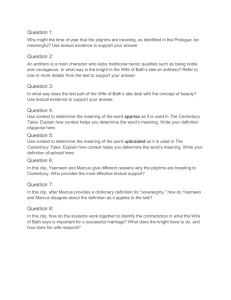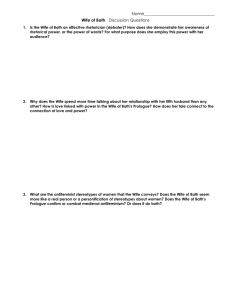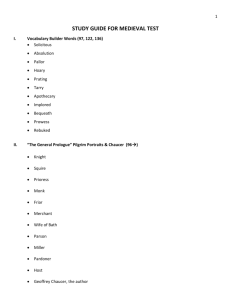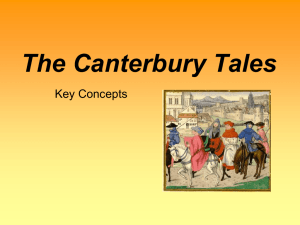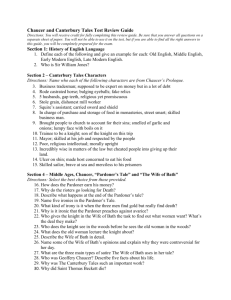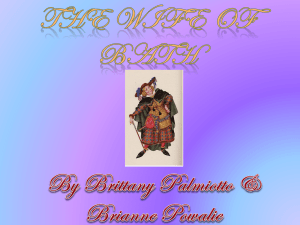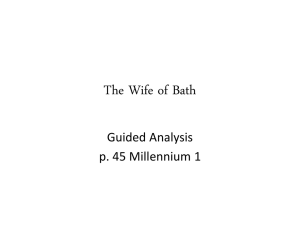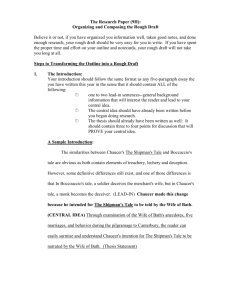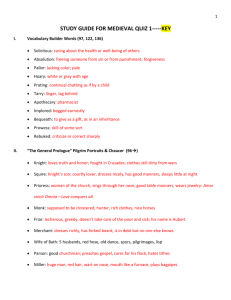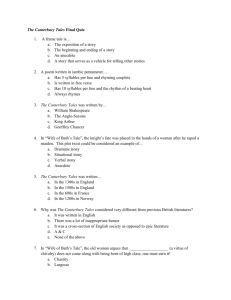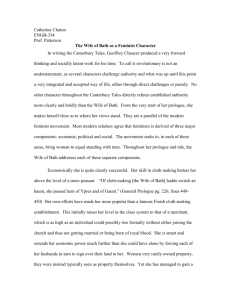Middle Ages Test Review: History & Literature Questions
advertisement
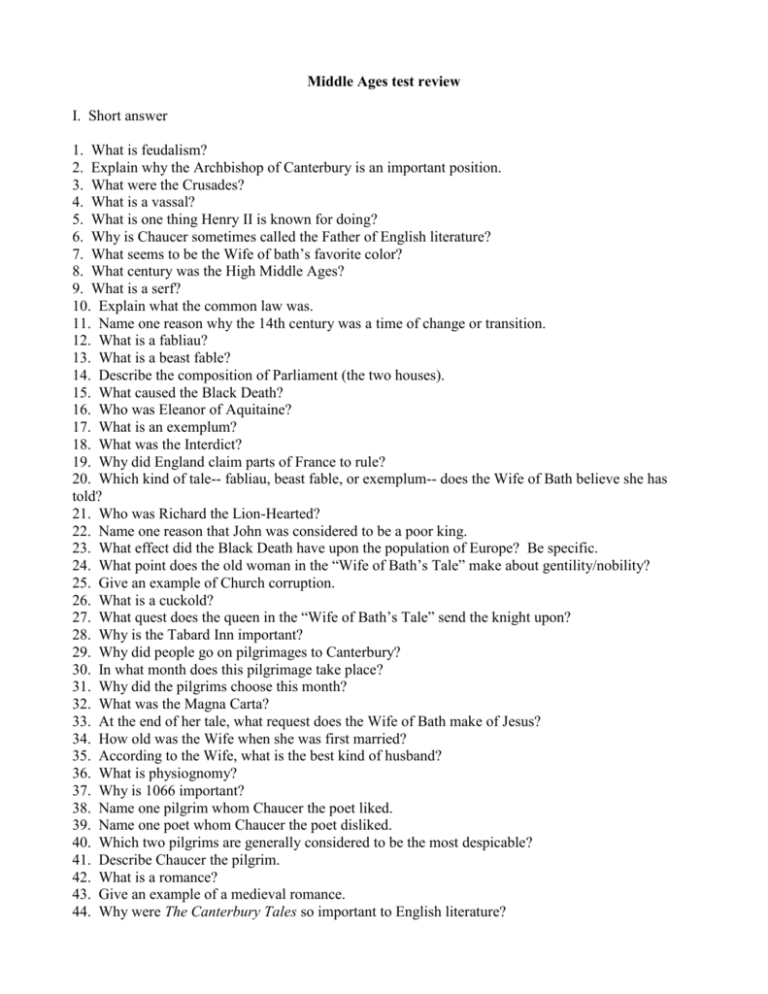
Middle Ages test review I. Short answer 1. What is feudalism? 2. Explain why the Archbishop of Canterbury is an important position. 3. What were the Crusades? 4. What is a vassal? 5. What is one thing Henry II is known for doing? 6. Why is Chaucer sometimes called the Father of English literature? 7. What seems to be the Wife of bath’s favorite color? 8. What century was the High Middle Ages? 9. What is a serf? 10. Explain what the common law was. 11. Name one reason why the 14th century was a time of change or transition. 12. What is a fabliau? 13. What is a beast fable? 14. Describe the composition of Parliament (the two houses). 15. What caused the Black Death? 16. Who was Eleanor of Aquitaine? 17. What is an exemplum? 18. What was the Interdict? 19. Why did England claim parts of France to rule? 20. Which kind of tale-- fabliau, beast fable, or exemplum-- does the Wife of Bath believe she has told? 21. Who was Richard the Lion-Hearted? 22. Name one reason that John was considered to be a poor king. 23. What effect did the Black Death have upon the population of Europe? Be specific. 24. What point does the old woman in the “Wife of Bath’s Tale” make about gentility/nobility? 25. Give an example of Church corruption. 26. What is a cuckold? 27. What quest does the queen in the “Wife of Bath’s Tale” send the knight upon? 28. Why is the Tabard Inn important? 29. Why did people go on pilgrimages to Canterbury? 30. In what month does this pilgrimage take place? 31. Why did the pilgrims choose this month? 32. What was the Magna Carta? 33. At the end of her tale, what request does the Wife of Bath make of Jesus? 34. How old was the Wife when she was first married? 35. According to the Wife, what is the best kind of husband? 36. What is physiognomy? 37. Why is 1066 important? 38. Name one pilgrim whom Chaucer the poet liked. 39. Name one poet whom Chaucer the poet disliked. 40. Which two pilgrims are generally considered to be the most despicable? 41. Describe Chaucer the pilgrim. 42. What is a romance? 43. Give an example of a medieval romance. 44. Why were The Canterbury Tales so important to English literature? 45. What did the peasants gain from the Black Death? 46. Who was Thomas à Becket? 47. What kinds of things characterized the High Middle Ages? 48. Why is it especially shocking that the knight in the “Wife of Bath’s Tale” rapes a young maiden? 49. What was the Peasants’ Revolt? 50. What broke up the Peasants’ Revolt? 51. Name one thing the peasants demanded in the Revolt. 52. Why is the knight going on the pilgrimage to Canterbury? 53. Name the three levels of society in the Middle Ages. 54. Who were the Franciscans and the Dominicans? 55. What were universities originally designed to do? 56. What sort of people were elected to Parliament’s House of Commons? 57. What is the monk’s big flaw? 58. Why was the 14th century an age of discontent? 59. What happened to Edward II? 60. In the “Wife of Bath’s Prologue,” who was Johnny? 61. In the “Wife of Bath’s Prologue,” who was Allison? 62. What does the Wife of Bath think about at the funeral of her fourth husband? 63. What is implied by the Wife of Bath’s gapped teeth? 64. Why is the punishment that the knight receives in the “Wife of Bath’s Tale” especially appropriate? 65. Tell three things about Chaucer the writer. 66. Where does the title “Prince of Wales” come from? 67. Under Henry II, which two French territories did England claim? 68. Following the Norman Conquest in 1066, what language did the common people of England speak? 69. What language did the nobility speak? 70. What was the official language of the Church? 71. Describe one of Arthur’s dreams in Morte d’Arthur. 72. Who was Mordred? 73. What started the huge battle in this story? 74. Describe the fight between Arthur and Mordred. 75. Who was Sir Bedivere? 76. Who was the hermit at the end of the story? 77. What is the inscription on Arthur’s tomb? 78. Under what conditions did Sir Thomas Malory write Morte d’Arthur? 79. What happened to Sir Lucan? 80. What happened to Arthur after Bedivere threw Excalibur into the lake? 81. Early in the Middle Ages, why was the nobility reluctant to openly rebel against a king? II. For each quote, give the pilgrim being described. 82. She was indeed by no means undergrown. 83. No quicksilver, lead ointments, tartar creams, Boracic, no, nor brimstone, so it seems, Could make a salve that had the power to bite, Clean up or cure his whelks of knobby white. 84. This little proverb he would add thereto That if gold rust, what then will iron do? 85. He had grown rich and had a store of treasure tucked away, yet out it came to pleasure His lord with subtle loans or gifts of goods. 86. A wrangler and buffoon, he had a store Of tavern stories, filthy in the main. 87. He did not rate that text at a plucked hen Which says that hunters are not holy men. 88. A lover and cadet, a lad of fire with locks as curly as if they had been pressed. He was some twenty years of age, I guessed. 89. He preferred having twenty books in red And black, of Aristotle’s philosophy, To having fine clothes, fiddle, or psaltery. 90. The thought of moral virtue filled his speech And he would gladly learn, and gladly teach. 91. He never yet a boorish thing had said in all his life to any, come what might. 92. But what a pity, so it seemed to me, That he should have an ulcer on his knee. 93. If, when he fought, the enemy vessel sank, He sent his prisoners home; they walked the plank. 94. As sheriff he checked audit, every entry. He was a model among landed gentry. 95. For courtliness she had a special zest, And she could wipe her upper lip so clean That not a trace of grease was to be seen. 96. He knew the taverns well in every town And every innkeeper and barmaid too Better than lepers, beggars, and that crew. 97. Gold stimulates the heart, or so we’re told. He therefore had a special love of gold. 98. He much disliked extorting tithe or fee, Nay rather he preferred beyond a doubt Giving to poor parishioners round about. 99. In all the parish not a dame dared stir Towards the altar steps in front of her. 100. And, at its very tip, his nose displayed A wart on which there stood a tuft of hair. 101. His chin no beard had harbored, nor would harbor, Smoother than ever chin was left by barber. I judge he was a gelding, or a mare. 102. His was a master hand at stealing grain. 103. He’d fixed up many a marriage, giving each Of his young women what he could afford her. 104. Just home from service, he had joined our ranks To do his pilgrimage and render thanks. 105. He loved so hotly that till dawn grew pale He slept as little as a nightingale. 106. Yet he was rather close as to expenses And kept the gold in won in pestilences. 107. He loved so hotly that till dawn grew pale He slept as little as a nightingale. 108. Yet he was rather close as to expenses And kept the gold he won in pestilences.
